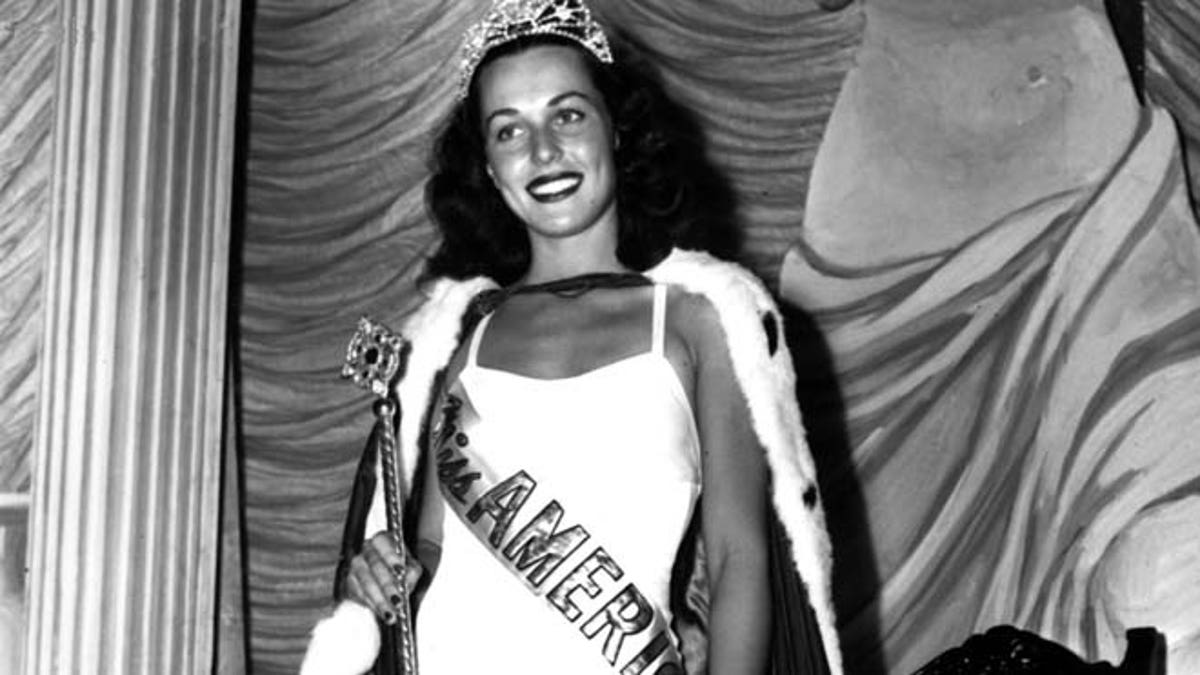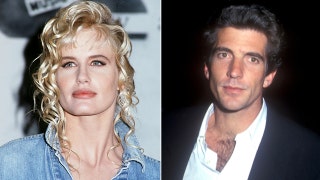
Sept. 8, 1945: Bess Myerson, of New York, holds the scepter after being crowned Miss America 1945 at the annual Miss America pageant in Atlantic City, N.J. (AP)
LOS ANGELES – Bess Myerson, the first Jewish Miss America and a New York political force until a series of scandals dubbed the "Bess Mess" forced her into obscurity, has died. She was 90.
Myerson died Dec. 14 at her home in Santa Monica, California, according to the Los Angeles coroner's office and Department of Public Health Vital Records Office. Her death was first reported by The New York Times.
The Bronx-born Myerson was hailed as a Jewish, feminist Jackie Robinson — a groundbreaker for her religion and sex — after parlaying her stunning 1945 Miss America victory into national celebrity.
The 5-foot-10 dark-haired beauty, unlike her predecessors, accentuated her intelligence. Myerson landed a series of television jobs, from game show hostess to on-air reporter, before her appointment as New York City's chief consumer watchdog in 1969.
The popular Myerson helped Ed Koch win the 1977 mayoral race, deflecting rumors of the bachelor candidate's homosexuality — which he neither confirmed nor denied — with her constant presence at his side. "The immaculate deception," cynics called it after the couple shared an election night victory kiss.
She made her own bid for office in 1980: an unsuccessful Democratic primary run for U.S. Senate. Three years later, Koch appointed her Cultural Affairs commissioner — an $83,000-a-year post as the city's liaison to the arts.
"People like to read about me," she said in a 1987 interview. "They like to imagine themselves in my life."
But Myerson's carefully cultivated image crumbled in the mid-1980s under a barrage of political and personal embarrassments that became known as the Bess Mess.
A city background check exposed Myerson as an insanely jealous woman who harassed an ex-boyfriend and his new lover. She repeatedly invoked her right against self-incrimination in a 1986 corruption probe of a subsequent boyfriend, Carl "Andy" Capasso, who was born the year Myerson was crowned.
Capasso, a contractor with purported mob ties, pleaded guilty to nine counts of tax evasion.
Myerson, Capasso and Judge Hortense Gabel were indicted in October 1987 on a charge of conspiring to fix Capasso's divorce case. Prosecutors said Gabel's daughter, Sukhreet, received a city job in return for the judge's lowering of Capasso's alimony and child support payments.
Before that trial began the next year, Myerson was convicted of shoplifting nail polish and earrings from a Pennsylvania store. A 1970 shoplifting conviction was also made public.
Although Myerson and her co-defendants were acquitted in the divorce-fixing case, the damage was done. She had already resigned her Koch administration post, and her public career was virtually over.
The Miss America Organization said in a statement Monday that Myerson would be remembered for her unwavering commitment to equality.
"Bess used her Miss America title to fight anti-Semitism and racial bigotry as she traveled around the country," the organization said.
Bess Myerson was born July 16, 1924, the second daughter of Russian immigrants. Raised in a one-bedroom Bronx apartment, she was beloved by her housepainter father, Louis, and beleaguered by her strict mother, Bella.
By age 12, Myerson was taller and thinner than her classmates — she once played Olive Oyl in a school production. Her natural beauty soon emerged, and older sister Sylvia shepherded Myerson into the Miss New York City pageant in 1945.
Myerson won, advancing to Atlantic City for the Miss America pageant. Organizers urged her to change her name — they suggested "Betty Merrick" — but Myerson refused.
Her title, captured as the horrors of the Holocaust were coming to light, made Myerson a hero to her peers. Walking down the stage to cries of "Mazel tov!" from Jews in the audience, Myerson later recalled thinking, "This victory is theirs."
Not content with the stereotypical role of Miss America, Myerson left an exploitive vaudeville revue and mounted a speaking tour for the Anti-Defamation League.
"Miss America's brainy, too!" announced a Daily News headline about the Hunter College graduate-turned-pageant winner.
Myerson remained socially aware through the years. She received the ADL woman of the year award in 1965, the same year she began a seven-year stint as chairwoman of the Bonds for Israel fund.
After surviving ovarian cancer in the early 1970s, she took the lead in battling that disease. She was appointed to committees by Presidents Lyndon Johnson, Gerald Ford and Jimmy Carter.
Her first break came on TV game shows. Myerson appeared as the "Lady in Mink" on "The Big Payoff" from 1951 to 1959 and as a panelist on "I've Got A Secret" from 1957 to 1968. She served as commentator for the Miss America Pageant from 1964 to 1968.
She changed careers in 1969, when Mayor John V. Lindsay named her the city's consumer affairs commissioner. She stayed until 1973.
She backed Koch in the hotly contested 1977 mayoral race, holding hands with him as they marched in the Columbus Day parade. Koch media adviser David Garth said it was Myerson who put his candidate over the top.
Her loyalty was repaid Feb. 23, 1983, when Koch appointed her cultural affairs commissioner. It was a decision that did neither much good, however.
Myerson's problems were exposed amid several other scandals that kept Koch from winning a fourth term as mayor. But while Koch never left the public eye, Myerson's drop was precipitous — occasional appearances at cancer fundraisers or visits to friends' birthday parties.
Myerson, who was twice divorced, is survived by a daughter, Barra Grant, from her first marriage.














































